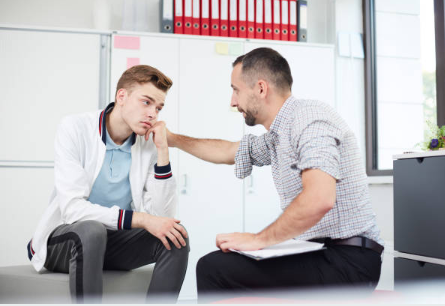What are some coping mechanisms for managing mental health symptoms?
Explore the effectiveness of cognitive-behavioral therapy (CBT) and other forms of talk therapy for managing symptoms of depression, anxiety, and other mental health disorders.

Selfpause Affirmation App
Download the app to get 1,000’s of affirmation meditations and everything you need to write, record and listen to your own.
Keeping one’s mental health symptoms under control can be a difficult and constant effort. Those who are struggling to manage their mental health symptoms and enhance their general well-being might benefit from the use of coping mechanisms, which are tools and methods that can assist them in doing so. In this piece, we will go over some of the coping strategies that can be used to manage the symptoms of mental illness.
The Practices of Mindfulness
Mindfulness techniques are a sort of meditation that can assist individuals in remaining present in the here and now and maintaining their attention on the immediate surroundings. Those who engage in these techniques may find that they are better able to manage the symptoms of anxiety and depression as a result of a reduction in feelings of tension and an increase in relaxation. Meditation, yoga, and deep breathing exercises are some examples of techniques that might help cultivate mindfulness.
CBT is short for cognitive-behavioral therapy (CBT)
Cognitive Behavioral Therapy, also known simply as CBT, is a type of talk therapy that focuses on modifying destructive patterns of cognition as well as actions. Individuals can learn how to identify and confront negative beliefs, as well as establish healthy coping mechanisms, through the use of cognitive behavioral therapy (CBT), which can help individuals manage the symptoms of anxiety and depression.

Social Support
One of the most essential coping mechanisms for managing the symptoms of mental illness is receiving support from one’s social network. Those who have a support system consisting of friends, family, or a support group at their disposal can benefit from having the opportunity to express their feelings in a setting that is both safe and supportive. Through the promotion of a sense of belonging and the alleviation of feelings of isolation, social support can assist individuals in the management of the symptoms of depression and anxiety.
Exercise
The management of mental health problems can be helped by exercise, which is an excellent coping method. Endorphins are naturally occurring chemicals in the brain that can improve one’s mood and reduce feelings of stress. Exercise can help individuals manage the symptoms of depression and anxiety by promoting the release of endorphins. This can help individuals manage the symptoms of depression and anxiety. Those who exercise regularly have a better chance of improving their general physical health, which in turn can have a beneficial effect on their mental health.
Expression of Creativity
The expression of one’s creativity via activities such as drawing, playing an instrument, or writing can be an effective means of coping with the symptoms of mental illness. Those who suffer from anxiety and depression may find that engaging in creative expression helps them better manage their symptoms since it gives them a creative outlet through which they may express their feelings and thoughts. Those who express themselves creatively often report higher levels of self-esteem, as well as increased emotions of success and happiness in their lives.
Self-Care
Self-care is an essential coping strategy for the management of symptoms associated with mental health. Self-care can be accomplished through a variety of activities, such as indulging in a hobby, taking a soothing bath, or simply spending time in the great outdoors. Self-care practices that encourage relaxation and cut down on emotions of stress are effective in helping persons manage the symptoms of depression and anxiety.
Medication
Managing the symptoms of mental illness with the use of medication is an effective method of coping. By controlling chemical processes in the brain and elevating mood, medication can provide patients suffering from depression, anxiety, and other mental health conditions with the ability to better manage their symptoms. It is essential to collaborate with a healthcare professional in order to ascertain the drug that will be most beneficial to an individual’s needs and the appropriate dosage of that medication.

Disturbance to One’s Thinking
Participating in activities that keep one’s attention diverted away from unfavorable thoughts or feelings is an example of the coping mechanism known as cognitive distraction. Activities such as crossword puzzles, board games, and reading are examples of cognitive distractions. With the facilitation of relaxation and the reduction of emotions of stress, individuals can find relief from the symptoms of anxiety and depression by engaging in cognitive distraction activities.
Sleep Hygiene
Maintaining good sleep hygiene is an essential coping mechanism for controlling the symptoms of mental illness. Practicing good sleep hygiene include forming healthy habits that are conducive to sleep, such as avoiding coffee in the hours leading up to bedtime, keeping a regular sleep schedule, and cultivating a restful sleeping environment. Those who practice good sleep hygiene are better able to handle the symptoms of anxiety and depression, as this leads to more restful sleep and an overall improvement in well-being.
Encouragement of Oneself
Altering one’s internal monologue to include more optimistic statements can be categorized as a coping method known as positive self-talk. By boosting one’s self-esteem and lessening emotions of self-doubt, individuals can better manage the symptoms of anxiety and depression through the practice of positive self-talk. Repeating positive affirmations to oneself throughout the day, such as “I am worthy” or “I am capable,” is one example of how positive self-talk can be implemented.

In addition, it is essential to keep in mind that coping methods are not intended to serve as a replacement for treatment provided by a qualified mental health expert. It is imperative that you seek the assistance of a mental health physician in order to receive the appropriate treatment for any symptoms related to your mental health. To assist individuals in managing their mental health symptoms, professionals in the field of mental health are able to provide a variety of treatment choices, such as talk therapy, medication, and several other interventions.
Finally, coping mechanisms should be utilized in conjunction with other methods of self-care, such as leading a healthy lifestyle, practicing good sleep hygiene, and refraining from abusing substances. This is the most effective way to deal with difficult situations. Individuals are able to play an active role in the management of their mental health and in the improvement of their overall well-being if they make use of coping mechanisms and engage in self-care practices.
In conclusion, coping techniques are essential tools for the management of symptoms associated with mental health conditions. Individuals can effectively manage their mental health symptoms by employing a variety of coping mechanisms, including mindfulness practices, cognitive behavioral therapy, social support, exercise, creative expression, self-care, medication, cognitive distraction, sleep hygiene, and positive self-talk. It is crucial to collaborate with a healthcare professional in order to build an individualized strategy for the management of mental health symptoms. It is important to remember that coping methods may not be effective for everyone, and it is essential to do so.
